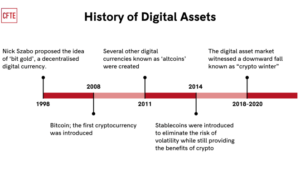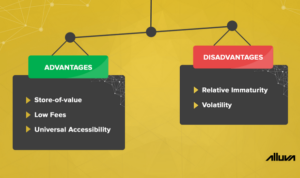How Crypto is Revolutionizing Finance kicks off a dynamic exploration of the intersection between cryptocurrency and traditional financial systems, promising a revolutionary insight into the evolving landscape of finance.
As we delve into the impact of decentralized finance (DeFi), the tokenization of assets, institutional adoption of cryptocurrencies, and the regulatory environment, the narrative unfolds with a blend of innovation and disruption that is reshaping the way we perceive and engage with finance.
Overview of Crypto in Finance
Cryptocurrency is a digital or virtual form of currency that uses cryptography for security. It operates independently of a central authority, such as a government or bank.
Role of Blockchain Technology
Blockchain technology is a decentralized and transparent ledger system that records transactions across a network of computers. It ensures security, transparency, and immutability of data.
Blockchain technology allows for peer-to-peer transactions without the need for intermediaries, reducing costs and increasing efficiency.
Cryptocurrencies Changing Traditional Systems
Cryptocurrencies are disrupting traditional financial systems by providing faster, cheaper, and more secure transactions. They offer financial inclusion to the unbanked population and reduce the reliance on traditional banking services.
Decentralized Finance (DeFi) Impact

Decentralized Finance, also known as DeFi, is a revolutionary concept that aims to transform traditional financial systems by utilizing blockchain technology. DeFi eliminates the need for intermediaries like banks and financial institutions, allowing for direct peer-to-peer transactions in a secure and transparent manner.
Reshaping Lending and Borrowing Practices
DeFi platforms are reshaping lending and borrowing practices by providing decentralized alternatives to traditional financial services. Users can lend out their crypto assets and earn interest, or borrow funds by using their crypto holdings as collateral. This opens up opportunities for individuals who may not have access to traditional banking services, while also offering lower fees and faster transaction times.
- DeFi lending platforms allow users to earn interest on their crypto assets by providing liquidity to the platform.
- Borrowers can access funds by collateralizing their crypto assets, without the need for credit checks or lengthy approval processes.
- Smart contracts are used to automate the lending and borrowing process, ensuring that funds are securely transferred and repayment terms are enforced.
Role of Smart Contracts in Enabling DeFi Applications
Smart contracts play a crucial role in enabling DeFi applications by automating the execution of transactions and agreements without the need for intermediaries. These self-executing contracts are stored on the blockchain and automatically enforce the terms of the agreement when predefined conditions are met.
- Smart contracts ensure that transactions on DeFi platforms are transparent, secure, and tamper-proof.
- They eliminate the need for trust between parties, as the terms of the agreement are coded into the contract and cannot be altered.
- By utilizing smart contracts, DeFi platforms can offer a wide range of financial services, including lending, borrowing, trading, and more, with increased efficiency and lower costs.
Tokenization of Assets: How Crypto Is Revolutionizing Finance

Asset tokenization refers to the process of converting real-world assets into digital tokens on a blockchain. This allows for fractional ownership and easier transfer of ownership, bringing increased liquidity and accessibility to traditionally illiquid assets.
Examples of Asset Tokenization
- Real Estate: Properties can be tokenized, allowing investors to buy and trade fractions of real estate assets.
- Artwork: High-value art pieces can be tokenized, enabling art enthusiasts to invest in and share ownership of artworks.
- Company Shares: Stocks and shares of companies can be tokenized, providing easier access to investment opportunities.
Benefits and Challenges of Asset Tokenization
Asset tokenization offers several benefits, such as:
- Increased Liquidity: Tokenizing assets can make them more easily tradable and accessible to a broader range of investors.
- Lower Costs: Digital tokens can streamline the process of asset ownership and reduce transaction costs.
- Fractional Ownership: Investors can purchase smaller fractions of high-value assets, diversifying their portfolios.
However, there are also challenges to consider:
- Regulatory Hurdles: Compliance with regulations related to securities and asset ownership can pose challenges for asset tokenization.
- Security Concerns: Ensuring the security of digital tokens and preventing fraud or hacking attempts is crucial in asset tokenization.
- Market Acceptance: The widespread adoption and acceptance of tokenized assets in traditional finance may take time to materialize.
Cryptocurrency Adoption by Institutions
Cryptocurrency adoption by institutions has been a significant trend in the financial world, with traditional financial institutions increasingly integrating cryptocurrencies into their operations.
Impact of Institutional Adoption, How Crypto is Revolutionizing Finance
- Increased legitimacy: As more institutions invest in cryptocurrencies, it helps to legitimize the market and improve public perception.
- Market liquidity: Institutional adoption leads to higher trading volumes and increased liquidity in the crypto market, making it more stable.
- Price stability: The involvement of large institutions can help reduce the volatility of cryptocurrencies, making them more attractive to mainstream investors.
Reasons for Growing Interest
- Risk diversification: Institutions are looking to diversify their portfolios by adding digital assets like cryptocurrencies, which have shown uncorrelated returns to traditional assets.
- Potential for high returns: The explosive growth of cryptocurrencies in recent years has caught the attention of institutional investors who are seeking high returns on their investments.
- Technological advancements: Institutional investors are recognizing the potential of blockchain technology and the efficiency it can bring to financial transactions, leading them to explore cryptocurrencies.
Regulatory Environment

Cryptocurrencies have been operating in a regulatory grey area for quite some time now. The decentralized nature of these digital assets has posed challenges for traditional regulatory bodies trying to enforce laws on them. However, recent developments have shown a shift towards more explicit regulations in the crypto space.
Current Regulatory Landscape
- Many countries have started to introduce regulations to oversee the trading, issuance, and use of cryptocurrencies.
- Regulatory bodies like the SEC in the United States have been cracking down on fraudulent crypto projects and unregistered securities offerings.
- Some countries have banned or restricted the use of cryptocurrencies altogether, citing concerns over money laundering and illicit activities.
Challenges of Regulating DeFi
- Decentralized Finance (DeFi) operates without intermediaries, making it difficult for regulators to monitor and enforce compliance.
- Smart contracts and autonomous protocols in DeFi platforms add another layer of complexity for regulators trying to ensure transparency and security.
- The borderless nature of DeFi platforms also raises jurisdictional challenges for regulatory bodies.
Potential Impact of Regulatory Changes
- Stricter regulations could lead to increased compliance costs for crypto businesses and projects, potentially stifling innovation in the industry.
- On the other hand, clear regulatory guidelines could attract more institutional investors to the crypto market, boosting mainstream adoption.
- Regulatory changes may also impact the price volatility of cryptocurrencies, with new laws and enforcement actions influencing investor sentiment and market dynamics.





